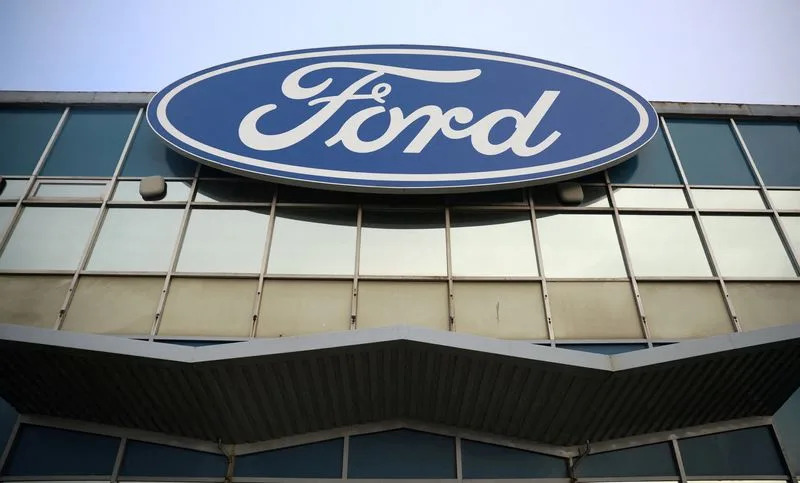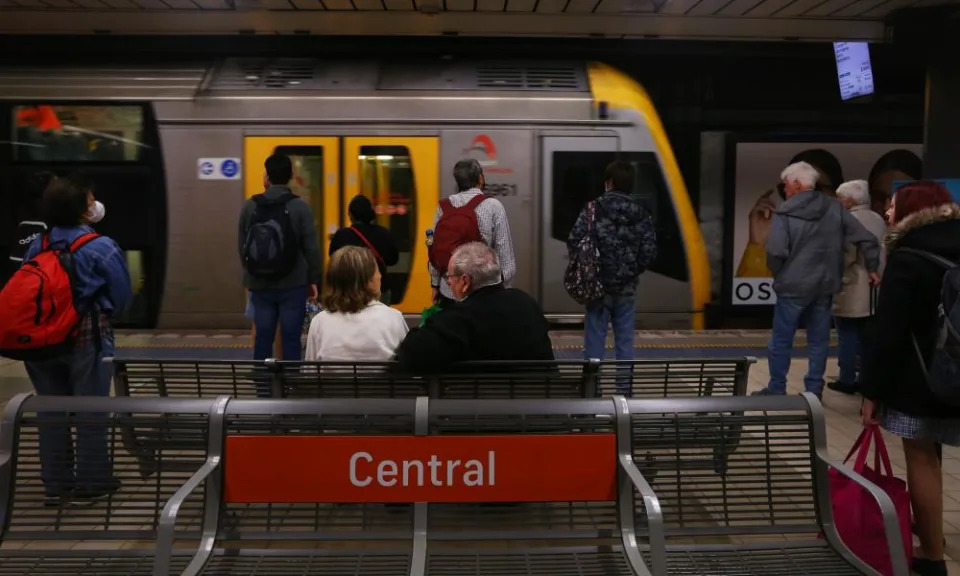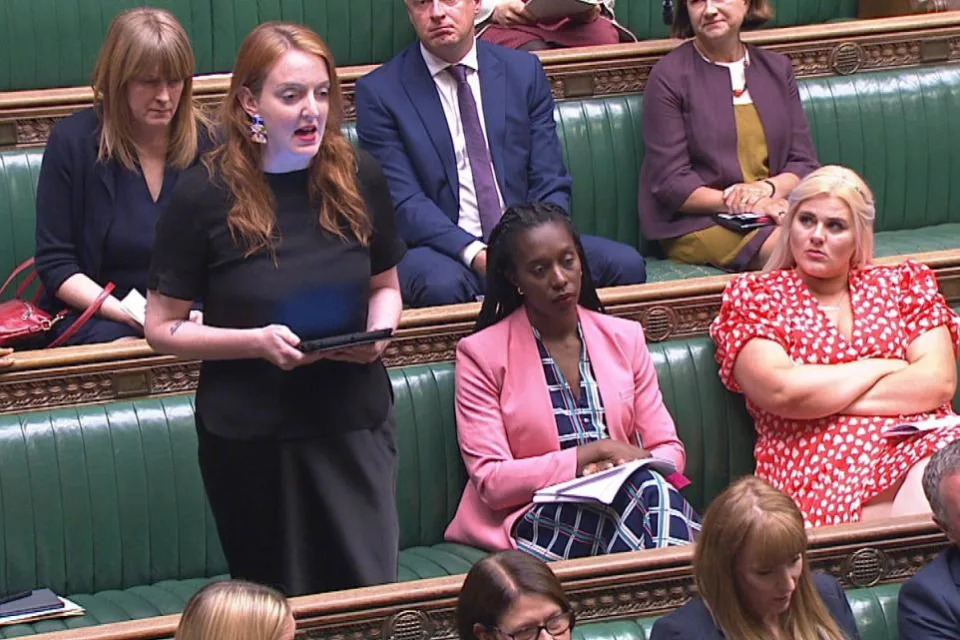French ski resort workers target half-term holidays with 'unlimited' strike action
Henry Samuel
Tue, 24 January 2023

Protesters demonstrate against the French government's pension reform plans outside the Place de la Republique in Paris on Jan 19 - Reuters
Half-term ski holidays in France are facing disruption after lift operators announced "unlimited" strikes in resorts next month over Emmanuel Macron's pension reforms.
Just weeks after skiers endured record-low snow cover over Christmas, their biggest obstacle to hitting the slopes in the next holiday period could now prove to be industrial action.
The two main French unions representing lift and tow operators and seasonal workers filed for open-ended strikes starting next Tuesday to coincide with the second day of mass protests against President Emmanuel Macron’s unpopular plan to raise the retirement age from 62 to 64.
“We have decided to call for a strike during the February holidays because demands are better heeded during this period,” said Eric Becker, head of the lift operators’ branch of the Force Ouvrière union. The other main union, Confédération Générale du Travail also called for “especially strong action” during the Ski World Cup at Courchevel and Méribel in mid-March.
February is peak season in French ski resorts in the Alps and Pyrenees as schools have two weeks off, while many Britons and other nationalities come over during their half-term breaks.
In an apparent attempt not to scare customers away entirely, unions say not all lifts, tows and cable cars will be blocked at once. Instead, they intend to stage rolling partial stoppages across the resorts.
Pascal de Thiersant, director of the Trois Vallées ski park in Savoie, blasted the union action. “After almost two years of Covid then the energy problem, the unions want to pile it on again. That’s really shooting themselves in the foot,” he complained.
The threat of blocked ski slopes is the latest militant action against Mr Macron's retirement reform, which more than 65 per cent of the public opposes, according to most polls.
Last Thursday, all of France’s main unions united for the first time in 12 years to stage a day of mass strike action that saw at least 1.2 million people take to the streets.
Despite the show of force, Mr Macron and his government are sticking to the retirement reform, which reaches parliament in late March.
However, he now faces growing dissent among MPs within his centrist Renaissance party and its allies. There are also splits among conservative Republicans, whom he will rely on to push through the bill in parliament, where he no longer has a majority.
Galvanised by mass action, unionists on Monday also pledged to step in to help bakers in Marseille, southern France, who are struggling to pay rocketing electricity prices.
Out of “solidarity”, the southern port’s CGT energie branch - which represents electricity and gas workers - called on members to doctor the electricity meters of any bakers “they meet” in order to halve their bills.
“In concrete terms, that means playing with the meter so that bakers can have a rate that is either 50 per cent or 60 per cent free,” local union leader Renaud Henry told RMC radio.

Hundreds of people in the baking profession protested against high energy costs in Paris on Jan 23 - AP
While he confessed the initiative was “totally illegal”, he argued that “it is also totally ethical for us”, as he said "speculators" were behind rising energy costs. EDF, France's main electricity utility, is 84 per cent state-owned.
Mr Henry urged energy workers to time ther "Robin Hood-style" action to help bakers with the next planned day of mass action, slated for January 31.
“The idea is that as bakers are mobilised (in strikes), we need to create a link with the working world that is fighting against this unfair pension reform,” he said.
At Monday’s bakers’ protest in front of the finance ministry in Paris, one Breton Boulanger named Alain told 20 Minutes that his energy bill was now five times higher.
“If the government does nothing, the bakers will rise. The French Revolution started because bread ran out.”
THE ABUSIVE FEMALE BOSS IS THE EVIL STEPMOTHER OF YORE
Cate Blanchett’s Tár is an abusive boss, but her story has much to tell us about feminism too
Susie OrbachTHE GUARDIAN
Tue, 24 January 2023

Following claims of misogyny, the debate about Tár – the film starring Cate Blachett as Lydia Tár, a famous, fictional and sexually predatory classical conductor – has been reframed in terms of power, not gender. But is that right?
Yes and no. We can’t ignore that she is a woman of a particular generation. Thirty years younger than second-wave feminists (my generation) who came of age in the early 1970s, she is not identified as the much smaller group of third-wavers, yet she fits that age group. If we take Tár as emblematic of her generation, we may better understand her character and the costs she faced.
Second-wave women knew that their power was problematic. They knew it was scary to take it up. They knew that as they endeavoured to do so, they would encounter internal constraints and taboos. Judgments would come from themselves if they risked doing so. Judgments would come from others as they dared to move forward.
What became critical in second-wave feminism was the joining together of women to understand the many conflicts – internal and external – that would ensue from breaking out of the expectations they had imbibed. We knew we needed one another as we attempted to break through these barriers. It wasn’t easy, but when support for personal and social change occurred it made us anew.
Of course, there were downsides. There was a tendency to walk in step, to not break ranks, to move forward in a literal phalanx in a new form of sisterliness that could, at times, stifle. Individual women taking up space could be experienced as threatening (as well as admired). Judgments would come from others as they dared to move forward and yet, it was managed.
When it came to parenting, second-wavers recognised that, in order to give their daughters the world, they needed to find a way to convey to them that conflict and fear would be part of what awaited them. The world would not be their oyster without that knowledge.
For the generation of women who grew up 10 to 20 years after the second wave, who were influenced by feminist ideas without having been in consciousness-raising groups, the noble longings they had for their daughters and students meant they foisted ambition and support for being “great” and “going for it” on them, while inadvertently leaving out the cost of inner conflict and doubt and the scariness of taking up space. Girl power was the mantra.
Tár embodies that generational ambition. She is a huge talent. She is fierce in her passion for music. She works hard. She is serious. She can’t, however, do vulnerability. When her daughter is bullied, she beats down the bully, perhaps as much to silence the scared part of herself. When a student in a masterclass questions knowledge based on the fecund composer Bach, she tries to invite him in, to show him Bach’s genius and musical questioning, to give this young man what she didn’t have in her training, but it backfires.
Related: Thank you, Cate Blanchett, for taking up the baton for female conductors
Tár appears fearless, even ruthless. She has a softness, yes, but we sense it is towards those who don’t have what she has. Then she is hurt by them or tires of them and discards them. Perhaps she can only tolerate a little of seeing needs that can’t be met.
Watching this film put me in mind of another current film, Women Talking, in which we witness the individual women of an isolated Mennonite colony struggling to speak up, to speak of their experience – much of it abject – and to come together to decide on scary action. It reminded me of the second wave, of daring to speak, to differ, to be difficult, to be tetchy, to be accepted, and yet find a way to work with one another, recognising complexity and difference. That struggle is what led many of us to psychoanalysis and to reconfigure it, to understand how the outside got in and the inside got out. It led other second-wavers to rethink history, art, science, education, technology, theatre and so on.
The many internal conflicts of being raised a girl these days – and boy, too – are as costly, limiting and not simply expansive as we may hope. It’s no surprise that emotional literacy and therapy, once ridiculed or hidden behind doors, are now prized. The young, the old: we all need to listen. We all need to be heard, to manage the complex multiple inequalities that are structural and internal.
Susie Orbach is a psychotherapist, psychoanalyst, writer and social critic
Ford to make call on Europe job cuts by mid-Feb as buyers circle German site
Victoria Waldersee and Christina Amann
Tue, 24 January 2023

Signage is seen outside the Ford Halewood transmissions plant in Liverpool, Britain
By Victoria Waldersee and Christina Amann
BERLIN (Reuters) -Ford will decide by mid-February how many jobs to cut in Europe, a German union said on Tuesday, as reports surfaced that BYD and car contract manufacturer Magna were interested in buying one of the U.S. carmaker's German sites.
The future of the site in Saarlouis, Germany has been unclear since last June when Ford picked a site in Spain to assemble its next-generation electric vehicle (EV) over the German plant, which will stop producing its current model, the Ford Focus, from 2025.
Among fifteen possible investors were companies in energy and car assembly as well as original equipment manufacturers, the works council chief of the Saarlouis site, Markus Thal, told Reuters.
The Wall Street Journal reported on Tuesday that Ford officials were travelling to China next week to visit BYD and discuss selling the site to the Chinese EV maker, citing sources familiar with the matter.
Autos publication Automobilwoche reported that Magna and VDL Nedcar were also among the fifteen interested investors.
"We are in ongoing discussions with a number of potential buyers and have nothing further to add at this time," a Ford spokesperson said, declining to comment on the individual companies named.
Spokespeople for BYD and Magna declined to comment. VDL Nedcar could not immediately be reached for comment.
"It is of secondary importance which continent a possible investor comes from - if a carmaker comes, that's what we would like to see, because it's what we do," Thal said.
He added that negotiations with possible investors had accelerated in recent months and the carmaker aimed to present a solution for the future of the plant by the end of the first quarter.
"We need a plan urgently," he added, saying workers would not wait until 2024 for a solution.
BYD told Reuters in October it was looking to produce electric cars in Europe, where it currently only makes electric buses at a plant in Hungary.
It sells three Chinese-made cars in a handful of European markets and said last November it plans to add more models and markets this year, one of numerous Chinese brands targeting Europe's growing EV market.
Separately, union representatives for Ford's largest German site in Cologne will meet on Saturday to discuss planned job cuts which the works council informed workers of in meetings on Monday.
Management figures were invited to present their plans to the workforce but did not provide any details, according to the works council.
The worst-case scenario was up to 2,500 job cuts in product development and a further 700 in administration, a union spokesperson said. A second scenario was also on the table, they added, declining to provide details.
A Ford spokesperson declined to comment on the planned cuts, referring to a Jan. 20 statement in which it said that the shift to EV production requires structural changes and it would not say more until plans are finalised.
The carmaker has committed to an all-electric lineup in Europe by 2030 and its U.S. leadership has repeatedly flagged that EVs require less labour.
Its European staff last saw a wave of job cuts in 2019 and 2020 as the carmaker pursued a 6% operating margin in the region, a goal thrown off course by the coronavirus pandemic, with pretax profit margins in Europe in the first nine months of 2022 at just 2.2% of sales.
The workers council in Cologne has demanded that management commit to no layoffs before Dec. 31 of 2032, and that the roughly 2,500 product development staff there remain part of the automaker's global development landscape.
(Reporting by Victoria Waldersee and Christina Amann; Editing by Paul Carrel, Alexander Smith, Andrea Ricci and Christina Fincher)
Ukraine corruption scandal: US promises 'rigorous monitoring' of aid
Euronews
Tue, 24 January 2023


The United States vowed to tightly monitor how Ukraine spends billions of dollars of aid on Tuesday, following a damaging corruption scandal that led to a string of resignations in Kyiv.
While Washington said it had no evidence western funds were being misused, US State Department Spokesman Ned Price promised there would be "rigorous monitoring" to ensure American assistance was not diverted.
Several senior Ukrainian officials were dismissed on Tuesday, in the wake of a corruption scandal surrounding illicit payments to deputy ministers and over-inflated military contracts.
A total of five regional governors, four deputy ministers and two heads of a government agency left their posts, alongside the deputy head of the presidential administration and the deputy attorney general.
In his nightly address, Ukrainian President Volodymyr Zelenskyy said the purge was "necessary" to maintain "a strong state", while Price hailed it as "quick" and "essential".
Still, the scandal comes at a sensitive time for Kyiv, as it asks for ever-increasing amounts of support from the West and faces down Russian advances in the east.
Corruption could dampen Western enthusiasm for the Ukrainian government, which has a long history of shaky governance.
Corruption in Ukraine: Is time running out for Zelenskyy to reform the country?
Over the weekend, anti-corruption police arrested the deputy infrastructure minister on suspicion of receiving a 367,000 euro bribe to buy overpriced generators, an allegation he denies.
This comes at a time when Ukrainian civilians are enduring prolonged power cuts, amid crippling Russian strikes on the country's energy infrastructure.
Meanwhile, a Ukrainian newspaper investigation accused the Defence Ministry of signing off contracts to supply food to frontline troops at "two to three" times the regular price.
According to analysts, the high-profile resignations show that corruption bears not only a criminal but also political responsibility.
"It is a good example of how institutions and anti-corruption and checks and balances mechanisms established after the [2014 Maidan] Revolution of Dignity are working despite a full-blown war going on," Kateryna Ryzhenko from Transparency International Ukraine, an anti-corruption NGO, told Euronews.
"But the final part of these events should be played by the prosecution, investigative body, and the court when these cases are adjudicated to the full extent of the law," she added.
Ukraine war: Kyiv aid 'money laundering scheme', Christmas truce fails, Ukrainians honour war dead
Ukraine's Defence Ministry, which allegedly signed off on overpriced contracts worth €320 million, said the resignations would help "preserve the confidence of society and international partners."
On Sunday, it dismissed the allegations as "misinformation", warning they harmed the "interests of defence during a special period".
In January, the leader of Russia's Chechen Republic blasted Western aid to Ukraine as a "scheme for laundering money".
"I see that some are worried about the foreign aid to Ukraine. Do not worry! This is a working money laundering scheme. Western and Ukrainian officials will embezzle these funds, and no more than 15% of the entire aid will reach the trenches," Ramzan Kadyrov wrote on Telegram.
There is no evidence for this claim from the staunch Putin ally.
Zelenskyy was elected in 2019 on the promise of wide-reaching reforms to battle corruption and improve the economy.
During his time in office, the Ukrainian president sacked numerous ministers and officials as he battled to fight the malign influence of powerful people in the country.
AUSTRALIA
‘Ineffective’ rail corporation was designed to meet NSW budget goals, auditor general says
Tamsin Rose
Tue, 24 January 2023

Photograph: Lisa Maree Williams/Getty Images
New South Wales’s controversial rail corporation’s formation was ineffective, incohesive and opaque and the corporation was designed to meet the government’s immediate budgetary goals, the auditor general has found.
Margaret Crawford’s report into the Transport Asset Holding Entity, or Tahe, also found the design had created an “unnecessarily complex” model with “significant uncertainty” around the possibility for future financial improvements.
“The design and implementation of Tahe was not effective,” she said.
Related: PR firm given $560,000 to combat ‘negative’ views of controversial NSW rail body
“The process was not cohesive or transparent. It delivered an outcome that is unnecessarily complex in order to meet the NSW government’s short-term budget objectives, while creating an obligation for future governments to sustain Tahe through continuing investment, and funding of the state-owned rail operators.”
Tahe was established in 2020 after seven years of planning to transfer the state’s $40bn rail assets out of the hands of the transport department and into a state-owned corporation.
The move benefited the government’s bottom line by allowing Tahe to lease assets back to operators like Sydney Trains, meaning the government could classify funding to the corporation as “equity injections” that came without negative implications for the budget.
But under accounting rules, the corporation needed to show it was separate from the government and would turn a profit.
Sign up for Guardian Australia’s free morning and afternoon email newsletters for your daily news roundup
Crawford found the “ineffective” design process had created a model with “significant uncertainty” regarding its future financial position.
She also found the agencies involved in its development relied heavily on private consultants and had “failed to effectively manage these engagements”.
A handful of agencies had been used repeatedly to provide advice on the same topic, she found, which brought the total cost of Tahe-related consultants’ fees to $22.6m – almost double the initial estimate.
Crawford described a chaotic design process in the lead-up to Tahe’s launch in 2020 with multiple workstreams and advisory committees working on it.
“The lack of clarity around the roles and responsibilities of these governance structures reduced opportunities for Transport for New South Wales and Treasury to reconcile their differing objectives for Tahe, and resolve key questions earlier in the process,” Crawford said.
Crawford recommended the government agencies involved in the scheme needed to improve accountability and transparency and review record-keeping and consultant engagement processes.
Asked about the report ahead of its release late on Tuesday afternoon, the premier, Dominic Perrottet, said other states had similar schemes because they were “right”.
“This is not something that NSW has done in isolation,” he said earlier in the day.
“Through that structure, you have better management of the transport assets and that’s why we undertook that process.”
The opposition has pledged to abolish Tahe if it is voted into government in March.
The Labor treasury spokesperson, Daniel Mookhey, described the scheme as a “budget con that’s turned into a fiscal bomb”.
In late 2021, Crawford delayed the release of the state’s finances over Tahe, after which the state poured $1.1bn into the system to meet the auditor’s concerns.
Finally giving the finances the tick just under a year ago, she said she still had concerns about the financial assumptions underpinning Tahe.
At the time, she said the NSW Treasury predictions remained “highly dependent” on revenue which “may not eventuate”, revealing taxpayers needed to contribute a further $4.1bn over the next decade to satisfy accounting standards.
Last year, Guardian Australia revealed the government awarded a public relations firm half a million dollars to devise a strategy to combat “negative” perceptions of Tahe.
BNP Paribas says to sharply cut oil production financing
Tue, 24 January 2023

French bank BNP Paribas said Tuesday it plans to cut its financing of oil extraction and production by 80 percent by 2030.
The pledge goes further than its previous 25-percent cut by 2025, even if oil refining and gas extraction are not covered.
BNP Paribas had 5.3 billion euros in oil extraction and production financing as of the end of last September, and intends to reduce that to below one billion by 2030.
By comparison, BNP Paribas had 12.1 billion euros of financing for oil refining, 5.0 billion for natural gas and 1.3 billion for coal.
The 23.7 billion in fossil fuel financing is already outweighed by the 28.2 billion in low-carbon financing, the overwhelming majority of which is for renewables.
BNP Paribas said it plans to have more than 80 percent of its energy production financing activities geared towards the production of low-carbon energies.
It set a target of 40 billion euros in outstanding financing for the production of low-carbon, primarily renewable, energies by 2030.
The bank said outstanding financing for gas extraction and production will be reduced by more than 30 percent by 2030.
It said it plans to focus financing in the gas sector on new-generation, low-emission power plants as well as supply security, gas terminals and gas transportation fleets.
The announcement by the bank comes after three activist groups threatened to file a lawsuit against the company for breaking pledges to stop financing new oil and gas projects.
They had given the bank until Thursday to respond.
Banks and asset managers are regularly scolded by climate activists for financing the fossil fuel sector, in particular new climate projects which experts say are incompatible with reaching carbon neutrality by mid-century and limiting global warming to the target of 1.5C as set out in the Paris climate pact.
ktr/rl/imm
Brexit was meant to be ‘done’, but in 2023 UK-EU harmony will still be a distant dream
Anand Menon
Tue, 24 January 2023

Just under three years since the United Kingdom left the European Union – and over six since it voted to do so – the bilateral relationship remains a subject of often bitter debate between the two sides and within the UK itself. This is hardly surprising. The 2016 referendum was deeply divisive: leave and remain identities persist to this day. Moreover, the two sides are still at loggerheads over the Northern Ireland protocol. Yet there is a structural element to this too, which implies that, come what may, a stable equilibrium in UK-EU relations will remain elusive.
This is clearly the case should no solution be found to the standoff over the protocol. In that event, it is possible the trade and cooperation agreement (TCA), which underpins the bilateral relationship, will itself not be fully implemented – and that a running dispute and conceivably even a trade war may ensue.
Yet even should a mutually satisfactory deal be found, bilateral relations will remain unstable, as our new report implies. For one thing, several issues are scheduled to be revisited in the coming years. Fishing quotas will have to be renegotiated in 2026. On financial services, the UK has to decide whether to extend the temporary scheme that allows European Economic Area-based financial services to continue to enjoy their pre-Brexit passport rights and that is currently due to end at the end of 2023, while the EU must decide whether to renew its equivalence decision on UK clearing houses in June 2025. Changes in the rules of origin applied to trade in electric vehicles will come in in 2024 and 2027; and given the lack of domestic battery-making capacity on both sides, this might lead to an end to tariff-free trade in EVs. And, of course, the TCA itself is due to be reviewed from 2025.
Any of these discussions could prove explosive given the political and economic stakes. And even if bilateral negotiations go well, purely domestic action by either side might serve to rock the boat. The “level playing field” conditions included in the TCA were intended to ensure that workers’ rights and social and environmental protection are not reduced. Consequently, adoption of the retained EU law (revocation and reform) bill, currently making its way through parliament, might trigger trade sanctions from the EU were the removal of EU legislation to imply an impact on trade and investment.

‘The EU and UK are still at loggerheads over the Northern Ireland protocol’. Photograph: Clodagh Kilcoyne/Reuters
Equally, what the EU chooses to do will have implications over the Channel. Its carbon border adjustment mechanism – essentially a way of imposing a fee on carbon-intensive goods from countries with less stringent climate policies – implies that, should the UK fail to align with what the EU is proposing, UK exporters might be subject to levies – with the steel sector particularly vulnerable. And, lest we forget, divergence between UK and EU regulatory systems will impact on the Great Britain-Northern Ireland border, hindering the flow of goods.
And then there is the impact of the consequences of Brexit. Last year saw the debate about the economic impact of Brexit kick off in earnest as we began to get real-world empirical data to compare to the economic forecasts. A growing proportion of the electorate are coming to believe that Brexit is having a harmful effect on the UK economy. There is no shortage of voices calling for amendments to the current status quo.
For some, this is taking the form of demands to mitigate some of the deleterious impacts of the current deal. Researchers in both the UK and EU have voiced their concerns about EU foot-dragging on UK participation in the Horizon research programme. It is conceivable, too, that the UK may reconsider its decision to leave the EU’s “list of travellers” scheme, thereby making it easier for school trips from EU states to visit.
At the same time, polling indicates growing support for rejoining the EU. The Brexit debate will remain live within the UK and the signs are that pressure will not abate for a relationship with the EU going beyond the TCA – and potentially implying single market membership or even a future membership application.
In short, we are not – and with apologies to David Cameron – about to stop banging on about Europe. Discussing his country’s relationship with the US, former Canadian prime minister Pierre Trudeau reflected that “Living next to you is in some ways like sleeping with an elephant. No matter how friendly and even-tempered is the beast, if I can call it that, one is affected by every twitch and grunt”.
The EU is clearly not the US. Yet its economic influence is significant and it remains the UK’s largest trading partner. Whether it be the bilateral relationship itself, or the implications of what the two sides decide to do at home for that relationship, Europe will loom large in our political debate for the foreseeable future. The elephant’s twitches and grunts will continue to disturb us.
Anand Menon is director of The UK in a Changing Europe and professor of European politics and foreign affairs at King’s College London
UK
Labour MP takes aim at Home Secretary in expletive-laden rant
Tom Bedworth
Tue, 24 January 2023

Charlotte Nichols unloaded an expletive-laden tirade on the Home Secretary (Image: Newsquest / Parliament UK)
WARRINGTON North's Labour MP, Charlotte Nichols, has been at the centre of controversy after she posted an expletive-laden rant against the Home Office.
Taking aim at the Home Office and Home Secretary, Suella Braverman, Ms Nichols claimed that the Home Secretary has used 'Nazi era language' when discussing 'contemporary refugees.'
The debate began due to an exchange between the Home Secretary and a survivor of the Holocaust - which saw the mass murder of six million Jews during the Second World War.

Warrington Guardian: Ms Nichols lashed out at the Home Secretary for her use of 'Nazi era' language
Ms Nichols lashed out at the Home Secretary for her use of 'Nazi era' language (Image: Parliament UK)
Suella Braverman was taking questions at an event when a Holocaust survivor asked the Home Secretary about her use of language, including the terms 'swarms,' and 'invasion' when referring to migrants.
The survivor noted that the language reminded her of the language used to 'dehumanise and justify the murder of [her] family and others.'
In the exchange, the Home Secretary was heard responding saying: "We mustn't shy away from saying there is a problem - and there is a huge problem when it comes to illegal migration; the scale of which we have not known since the war.
"I won't apologise for language I have used to demonstrate the scale of the problem[...] and I'm not going to shy away from difficult truths."
The Home Secretary added that she is 'proud of' the country's record on supporting migrants from places such as Ukraine, Syria, and Afghanistan.

Warrington Guardian: The Home Secretary has been accused of using 'Nazi era' language by one of Warrington's MPs
The Home Secretary has been accused of using 'Nazi era' language by one of Warrington's MPs (Image: Parliament UK)
Responding to the exchange online, Charlotte Nichols - who is Jewish - said: "The full exchange doesn't make what Suella Braverman said any less horrific, nor does it contextualise or minimise her remarks where - in response to a Holocaust survivor's question - she justified her use of Nazi era language about contemporary refugees."
Ms Nichols added: "F*** her and f*** you."
Having seen Ms Nichols' response to the exchange, a Conservative councillor for Culcheth, Wendy Maisey, took to social media.
Cllr Maisey said: "I see ‘Warrington Conservatives best asset’ aka the Labour MP for Warrington North has been up to her foul mouth 2.30am rants again.
"One of the main roles of an MP is to represent their constituents in the chamber and debate… Not this."
Ms Nichols responded to Cllr Maisey, saying: "The fact you find someone who justified their use of Nazi era language about refugees to a Holocaust survivor less offensive than what I said in response to that is very telling."
Speaking to the Warrington Guardian, Charlotte Nichols said: "I do not apologise for my sentiments of disgust at the Home Secretary using Nazi-era language about refugees in response to a question from a literal Holocaust survivor.
"Likewise, Ministers trying to use official Home Office resources to gag the Freedom from Torture charity [the charity that highlight the Home Secretary's exchange with a survivor] is disgraceful.
"I was elected to champion Warrington North’s values, and we are better than this.
I will not accept lectures from the chair of Warrington Conservatives [Cllr Maisey] who has a record of making homophobic and antisemitic comments, and who oversaw the council selection of candidates who were removed for comments about the "Aryan race" and support for Tommy Robinson respectively.
"I do not hide behind anonymity. I stand by my words and will never stand back from for fighting with passion for a better and fairer society."
Cllr Maisey has not responded to a comment request by the Warrington Guardian.
UK‘It isn’t too late to turn things around’: Over 500 museums join forces for climate project aimed at ‘inspiring’ children
Annabel Nugent
Tue, 24 January 2023

Hundreds of museums across the UK are joining forces to “change children’s awareness and understanding of biodiversity loss”.
Launched on Tuesday (24 January) by the UK’s leading arts charity, Art Fund, The Wild Escape will see 500 instututions participate, marking the largest ever collaboration between British museums.
The Wild Escape hopes to inspire children across the country to visit museums and respond creatively to the threat to the UK’s natural environment. Children will be encouraged to look for animals featured in museum collections and creating their own wildlife artworks.
Their artworks will then be brought to life in a huge-scale immersive display, which will be unveiled on Earth Day (22 April) 2023.
The Wild Escape is inspired by BBC One’s forthcoming Wild Isles series, which will be presented by Sir David Attenborough. It is in partnership with BBC Bitesize, the free study resource for students, which will host films showing an artist creating a work inspired by animals in the UK’s museum collections.
Artists due to take part in the intiative include FKA Twigs, Es Devlin, Heather Phillipson, Rana Begum, Mollie Ray, Yika Shonibare, Tai Shani, Mark Wallinger, Angela Palmer, and Claire Twomey.
Jenny Waldman, director of Art Fund, said that The Wild Escape hopes to educate children and raise their awareness and understanding of biodiversity loss, which is “one of the defining challenges of our lives”.
“The Wild Escape is a first. We want to show how museums, by working together, can bring a fresh angle to learning, especially to welcome children’s creative responses to our great collections,” said Waldman.

Clare Twomey in her studio, drawing for The Wild Escape (© Clare Twomey)
According to a report by the Environment Agency, published in July 2022, England is one of the most nature-depleted countries in the world.
A quarter of mammals in England and almost a fifth of UK plants face a threat of extinction. Meanwhile, a third of British pollinator species have declined.
The project is in partnership with the World Wide Fund for Nature (WWF), the Royal Society for the Protection of Birds, the National Trust, and English Heritage. It is one of the largest ever museum projects to ever be funded by Arts Council England.
Rosalind Mist, director of education and youth management at WWF, said: “It isn’t too late to turn things around, and young people are key to shaping the nature of the natural world”.
The Wild Escape is open to every primary school age child to take part from now until July.
NO LAUGHING MATTERUK
Staff have 'lost trust' with Basildon Hospital bosses over nitrous oxide sagaLewis BerrillMon, 23 January 2023  Staff have 'lost trust' - Basildon Hospital (Image: PA)STAFF at Basildon have “lost trust” in bosses after the results of health testing for high levels of nitrous oxide were kept hidden.Hospital bosses first learnt of Entonox - nitrous oxide used as pain relief during labour - in the ward since the summer of 2021.Nitrous Oxide personal sampling was completed on June 15, 2021, with high results found in nine staff members.However, those nine staff were not told they had recorded high tests leading to large amounts of anxiety and a level of distrust between management and staff.The nine staff who recorded high tests but were not told have been offered both psychological and wellbeing support and have received an apology from the hospital.Results ranged from from 107 to 2983.7 parts per million (ppm) - when the legal workplace limit is 100ppm - but the report was not shared with staff for 18 months.“We have lost trust in the hospital after we were kept in the dark so long, with everyone acting as if everything was okay,” one midwife told the Echo.“We are frustrated that they had our test results for all that time and nobody thought to tell us.“Or maybe nobody was brave enough to do so.”The results of this testing were sent in a report to the maternity department in June 2021. However, it was not shared with the staff involved.Hospital documents from a board meeting state “it is unclear of what processes were followed in terms of sharing and escalation, however, it is noted that this was added to the risk register at that time.”Three mobile destruction units were ordered but only installed in October 2022 - which prompted staff to challenge bosses on the matter.On October 11 the trust’s executive body was informed that the results had been kept from staff.“This caused a significant amount of anxiety and distrust between staff and senior leadership team,” the meeting documents added.A spokesperson for Mid and South Essex NHS Trust, said: “We have followed all of the expert advice provided to us to deal with the issue of nitrous oxide in the air at our maternity unit at Basildon Hospital.“Significant improvements have been made and it is perfectly safe for service users and their families to continue to use the maternity unit as normal. We have taken action to resolve the situation and an investigation is underway.“Support and advice is being offered to our staff. Mitigations have been put in place, based on clinical recommendations, and we are continuing to keep our staff informed.”
Staff have 'lost trust' - Basildon Hospital (Image: PA)STAFF at Basildon have “lost trust” in bosses after the results of health testing for high levels of nitrous oxide were kept hidden.Hospital bosses first learnt of Entonox - nitrous oxide used as pain relief during labour - in the ward since the summer of 2021.Nitrous Oxide personal sampling was completed on June 15, 2021, with high results found in nine staff members.However, those nine staff were not told they had recorded high tests leading to large amounts of anxiety and a level of distrust between management and staff.The nine staff who recorded high tests but were not told have been offered both psychological and wellbeing support and have received an apology from the hospital.Results ranged from from 107 to 2983.7 parts per million (ppm) - when the legal workplace limit is 100ppm - but the report was not shared with staff for 18 months.“We have lost trust in the hospital after we were kept in the dark so long, with everyone acting as if everything was okay,” one midwife told the Echo.“We are frustrated that they had our test results for all that time and nobody thought to tell us.“Or maybe nobody was brave enough to do so.”The results of this testing were sent in a report to the maternity department in June 2021. However, it was not shared with the staff involved.Hospital documents from a board meeting state “it is unclear of what processes were followed in terms of sharing and escalation, however, it is noted that this was added to the risk register at that time.”Three mobile destruction units were ordered but only installed in October 2022 - which prompted staff to challenge bosses on the matter.On October 11 the trust’s executive body was informed that the results had been kept from staff.“This caused a significant amount of anxiety and distrust between staff and senior leadership team,” the meeting documents added.A spokesperson for Mid and South Essex NHS Trust, said: “We have followed all of the expert advice provided to us to deal with the issue of nitrous oxide in the air at our maternity unit at Basildon Hospital.“Significant improvements have been made and it is perfectly safe for service users and their families to continue to use the maternity unit as normal. We have taken action to resolve the situation and an investigation is underway.“Support and advice is being offered to our staff. Mitigations have been put in place, based on clinical recommendations, and we are continuing to keep our staff informed.”















